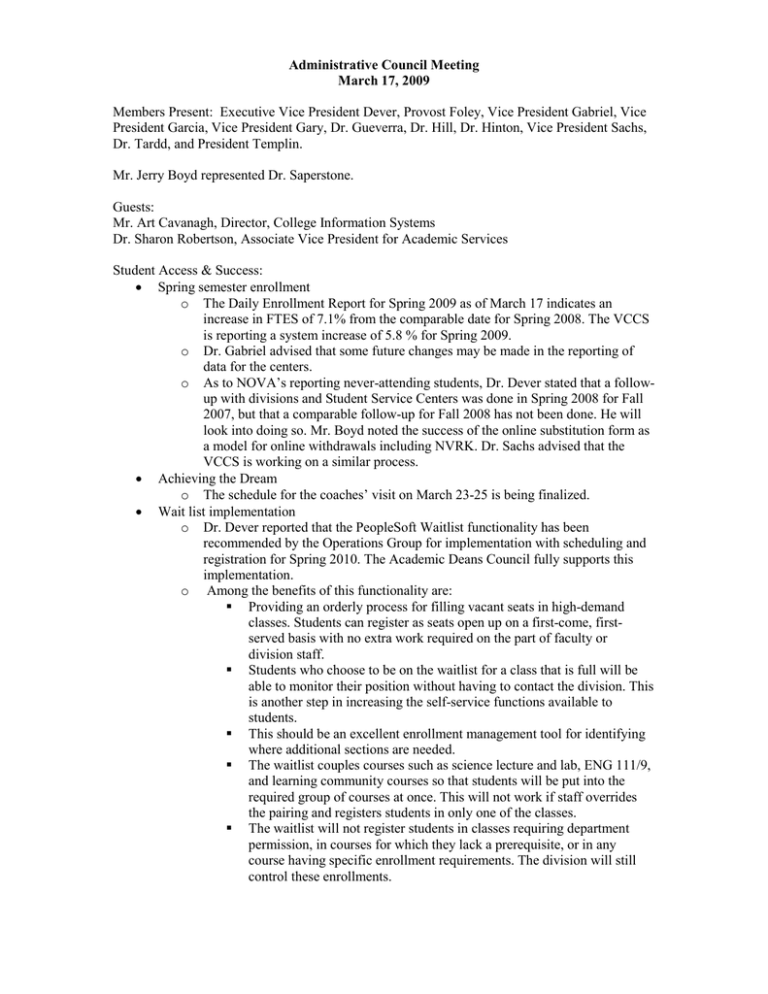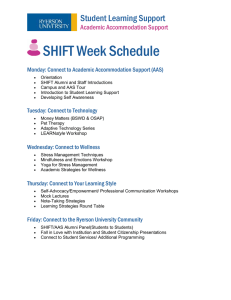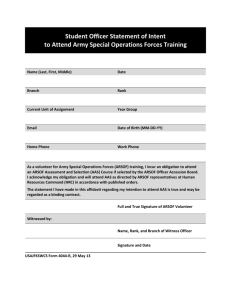Northern Virginia Community College
advertisement

Administrative Council Meeting March 17, 2009 Members Present: Executive Vice President Dever, Provost Foley, Vice President Gabriel, Vice President Garcia, Vice President Gary, Dr. Gueverra, Dr. Hill, Dr. Hinton, Vice President Sachs, Dr. Tardd, and President Templin. Mr. Jerry Boyd represented Dr. Saperstone. Guests: Mr. Art Cavanagh, Director, College Information Systems Dr. Sharon Robertson, Associate Vice President for Academic Services Student Access & Success: • Spring semester enrollment o The Daily Enrollment Report for Spring 2009 as of March 17 indicates an increase in FTES of 7.1% from the comparable date for Spring 2008. The VCCS is reporting a system increase of 5.8 % for Spring 2009. o Dr. Gabriel advised that some future changes may be made in the reporting of data for the centers. o As to NOVA’s reporting never-attending students, Dr. Dever stated that a followup with divisions and Student Service Centers was done in Spring 2008 for Fall 2007, but that a comparable follow-up for Fall 2008 has not been done. He will look into doing so. Mr. Boyd noted the success of the online substitution form as a model for online withdrawals including NVRK. Dr. Sachs advised that the VCCS is working on a similar process. • Achieving the Dream o The schedule for the coaches’ visit on March 23-25 is being finalized. • Wait list implementation o Dr. Dever reported that the PeopleSoft Waitlist functionality has been recommended by the Operations Group for implementation with scheduling and registration for Spring 2010. The Academic Deans Council fully supports this implementation. o Among the benefits of this functionality are: Providing an orderly process for filling vacant seats in high-demand classes. Students can register as seats open up on a first-come, firstserved basis with no extra work required on the part of faculty or division staff. Students who choose to be on the waitlist for a class that is full will be able to monitor their position without having to contact the division. This is another step in increasing the self-service functions available to students. This should be an excellent enrollment management tool for identifying where additional sections are needed. The waitlist couples courses such as science lecture and lab, ENG 111/9, and learning community courses so that students will be put into the required group of courses at once. This will not work if staff overrides the pairing and registers students in only one of the classes. The waitlist will not register students in classes requiring department permission, in courses for which they lack a prerequisite, or in any course having specific enrollment requirements. The division will still control these enrollments. Administrative Council Meeting March 17, 2009 Page 2 The waitlist will not allow students to register for multiple sections of the same course, for more than 18 credits, or to circumvent the repeat permission process. The waitlist functionality will not be activated for classes in Nursing, Allied Health, and Vet Tech, as there is already a process in place for controlling enrollment in restricted classes. Mr. Cavanagh provided information as to the set-up and use of the functionality. As PeopleSoft does not automatically inform students when they have been put into a class, it was agreed that identifying an efficient means for communicating with students is critical to the successful implementation and operation of this process. Comprehensive training will be provided to the divisions and other units. Correct data entry is critical. A workgroup will be charged with developing an implementation plan that includes staff training and communication with students. o The Administrative Council approved the implementation of the wait list functionality as recommended by the Operations Group. Fall semester extended hours of service: • Council members revisited the decision of September 9, 2008, to open offices serving students at 7:30 a.m. during the first week of classes. • It appears that the majority of the campuses did not experience sufficient usage during this extended period to warrant its continuation. As a result, during the first week of classes for the Fall 2009 semester, the college-wide announced opening time will be 8:30 a.m. Position Allocation Requests: • Dr. Templin discussed the FY 2009 reallocation of frozen positions for classified staff and for administrative and professional faculty. Seventeen positions have been approved for hiring. • Campuses not meeting their goal remain in a hiring freeze, except for a special allocation. • By March 31, Council members are to advise Dr. Templin of their top three to five highest priority, non-teaching, needs. • Dr. Templin advised that the college can use its vacancies as a restructuring tool to meet institutional priorities. Budget Planning Initiatives: • Dr. Templin stated that the savings captured during the hiring freeze can now be reinvested to meet the highest priorities of the institution. Special initiatives build capacity, which, in turn, grows the college and retains jobs. • Financial aid o Dr. Dever presented a revised proposal for enhancing financial aid services at NOVA. He noted the significant growth in all areas of financial aid as awareness of the program and student need have increased. In 2007-2008, there was an increase of 1,958 recipients (29.4%) over the previous year and an increase of over $10,000,000 in total aid awarded. The growth in student need was particularly evident in the increase of over 1,000 Pell Grant recipients. Administrative Council Meeting March 17, 2009 Page 3 For 2008-09, the expected growth remains significant: 8.8% and nearly $7 million more in total aid awarded. The long-term projection is an 8% annual growth in Financial Aid recipients, with a total of 15,000 students receiving aid by 2014-2015, approximately 17% of the student body. To support such growth, additional staffing resources are needed now as well as later in the projected time frame. o As current financial constraints necessitate targeting areas of most critical need, the proposal includes the following: Increasing the front-line workforce on all campuses by adding one fulltime financial aid specialist to Alexandria, Annandale, Loudoun, and Woodbridge, the campuses with the greatest number of students receiving financial aid; and adding one part-time (30 hours/week) financial aid specialist to Manassas and the Medical Education Campus. In addition to the proposed specialist increases, campuses are encouraged to provide increased administrative support to the financial aid offices. Adding two new positions to the Central Financial Aid Office to support expanded campus operations and provide better student service through more efficient and effective operations. An Associate Director for Campus Operations will work on a different campus each day, providing hands-on assistance with day-to-day operations, providing on-the-spot training and trouble-shooting, carrying out a limited number of functions now performed in the Central Office, and serving as the liaison between the campuses and the Central Office. A file reviewer position will also be added to the Central Office. The Central Office is currently undergoing various re-engineering processes to reduce the turnaround time to approximately three weeks for awards to students with completed applications. Future changes include transferring responsibility for collection of overpayments and Return to Title IV funds to the Financial and Administrative Services unit, and moving the veterans’ advisors into the campus financial aid offices. o Specific indicators for unit effectiveness will be developed to monitor the progress of the initiative. o Dr. Dever noted that additional funds and personnel will be needed later to continue the extensive effort necessary to meet the current and expected needs for financial aid. Benchmarks for future proposals should include best practices of proprietary institutions. o The Administrative Council approved the Financial Aid proposal as presented. The Notice of Vacancy and Employee Work Plan documents for these positions will be developed centrally. These new positions are expected to be filled as soon as possible to support enrollment for 2009-10. • Call center support & outsourcing o Dr. Gabriel stated that since the Call Center began taking the calls from the campuses’ main lines, the volume has steadily increased, especially during registration periods. This high volume has resulted in a large number of transfers and abandoned calls and a high level of frustration for callers. o Dr. Gabriel presented a proposal for restructuring the Call Center to increase productivity and efficiency. This proposal focuses on reducing the number of Administrative Council Meeting March 17, 2009 Page 4 calls transferred to the campuses and minimizing the number of abandoned calls. It includes the following: Training selected full-time representatives at the Call Center to transition from generalists to specialists. These specialists would become content experts in the most critical areas of the college. Adding three full-time specialists to the current staff. Providing Call Center specialists with some level of access to student records. Outsourcing some Call Center services during surge periods. Discussions are presently being held with CrisisLink, a 211 Virginia provider, for a possible pilot during the period of July 1 to August 15. o In order to identify and address gaps in Call Center service, baseline data for indicators of effectiveness should include: • Customer satisfaction • Volume of activity • Lost calls o To help gauge the needs and concerns of the students, the Administrative Council will be provided feedback as to the most common questions and concerns received at the Call Center. o The Administrative Council approved the Call Center recommendation as presented. Vice President Garcia and Dr. Gabriel will confer on the funding for the remainder of FY 09. • Marketing o Dr. Gabriel also presented a proposal for a marketing special initiative for FY 2009. This proposal would focus on promoting the Guaranteed Admissions Agreement as a tool to obtain a four-year degree, primarily utilizing radio promotion, targeted mailing, and newspaper ads. In 2009-2010, a similar initiative will be completed with the target message to be determined during the year. o The Administrative Council approved the proposal for the marketing special initiative for FY 09. • E-learning proposal o Dr. Sachs provided some updates to the NOVA Adult E-learning Initiative. While the overview remains the same, some financial aspects have been fine-tuned, and more focus has been put on the simultaneous needs to ramp up this initiative while meeting ELI’s regular demands. This initiative will pilot a new Student Success Coach position for adult learners. This position will manage the administrative and organizational aspects of the student support plan for providing a complete college experience. An immediate focus during the first two years of the initiative will be to repackage certificate programs currently offered by the College or ELI, and to provide them in an accelerated format geared toward the needs of adult learners. During Year 1, ELI will begin development of a special marketing campaign to raise awareness of ELI and to fine tune its message in preparation for specific target marketing of the new and re-designed courses in Years 2-4. At least half of ELI’s new course development each year will be dedicated to the initiative, resulting in approximately 10 new courses Administrative Council Meeting March 17, 2009 Page 5 each academic year, in addition to repackaging existing courses. By November 2009, ELI will identify, through market research, the first set of courses and programs needed by the adult learners. The primary objectives are to produce additional revenue for the College and to attract additional adult learners. While the initiative should enhance ELI’s ability to attract and serve more students of all ages, it is expected to produce a greater percentage of adult students in the new courses than in ELI as a whole. ELI will work with the Office of Institutional Research to develop specific methodology to measure the success of the initiative. o Dr. Templin noted the need to invest in the adult market as the high school market plateaus. The ELI initiative will be the first institution-wide effort targeting this population. o The Administrative Council approved the implementation of this initiative pending sufficient funds in the FY 10 budget. Curriculum Committee Recommendations: • Recommendations of the Minimum Degree Requirements Task Force. Discussion deferred. • Revisions to the list of approved general education electives. The Administrative Council approved the proposed changes to the list of approved education electives, effective Fall 2009. • Using history to meet social science & humanities requirements in one program. The Administrative Council approved the proposal to stop using HIS 101, 102, 111,112,187,243, 255, 256, 261 or 262 to meet both the humanities/fine arts requirement and one of the two social/behavioral science requirements in any given program. This will become effective Fall 2009. • Revisions to the Radiography AAS & initiate competitive admission process. The Administrative Council approved the proposal, as amended by the Curriculum Committee, to remove NAS 150 Human Biology, RAD 215 Correlated Radiographic Theory, and CST (SPD) 229 Intercultural Communication from the Radiography AAS curriculum and add BIO 141-142 Anatomy & Physiology I-II, to be effective Fall 2010. In consultation with the CST faculty, the RAD faculty must determine the extent to which oral communication objectives are addressed in the RAD courses in the program and report this information to the Curriculum Committee. The Administrative Council also approved the initiation of a competitive admission process for Radiography to begin with the class of Fall 2010. • Revisions to the Health Information Management AAS degree & Clinical Data Coding Career Studies Certificate and consideration of HIM course proposals. Dr. Robertson noted that this is the first step in revising the HIM curriculum. The Administrative Council approved the proposal to revise the Health Information Management AAS degree and Clinical Drug Coding Career Studies Certificate curricula, effective Fall 2009. It also approved the proposal to revise HIM 220, 230, and 260 and to develop a new 200-level HIM course, Electronic Health Record Management. The course proposals will be forwarded to the VCCS for final approval. Administrative Council Meeting March 17, 2009 Page 6 • Revisions to the IST AAS curriculum. Discussion deferred. • Discontinuation of the Travel and Tourism AAS Degree program. The Administrative Council approved the discontinuance of the Travel and Tourism AAS degree program, effective Fall 2009. • Expansion of Interactive Design Specialization of Communication Design AAS. The Administrative Council approved the proposal to expand the Interactive Design specialization of the Communication Design AAS degree program to the Loudoun Campus, effective Fall 2009. • Revision of the General Studies AS math requirement. The Administrative Council approved the proposal to revise the General Studies AS degree to require Math 151 Mathematics for the Liberal Arts 1 or higher rather than MTH 150 Topics in Geometry, effective Fall 2009. WDCE Quarterly Report: • Vice President Gary provided an update to the report presented at the March 3rd meeting. Based on the third quarter numbers, expenses are projected to be lower than revenue. There is no deficit projected for FY09. • Attention will be directed toward decreasing the shortfall in contract training. • Vice Presidents Garcia and Gary will confer as to the need for a budget adjustment based on these revised numbers. The forecast for next year’s WDCE targets will also be based on these numbers. Technology Strategic Plan. Discussion deferred. The next meeting of the Administrative Council is Tuesday, March 24, at 9:30 a.m. in the Large Board Room. Tracking: International Student Recruitment – March 24 Military Outreach Services – March 24 Grade Appeal Policy & Procedure – March 24 Student Grievance Policy & Procedure – March 24 Professional Development Committee – March 31 Curriculum Committee recommendations – March 31 • Approve Concept of Acceptance of Standard Level IB Course Credit • Allow students to take MTH 1 Developmental Mathematics four times • Communication Design action plan


